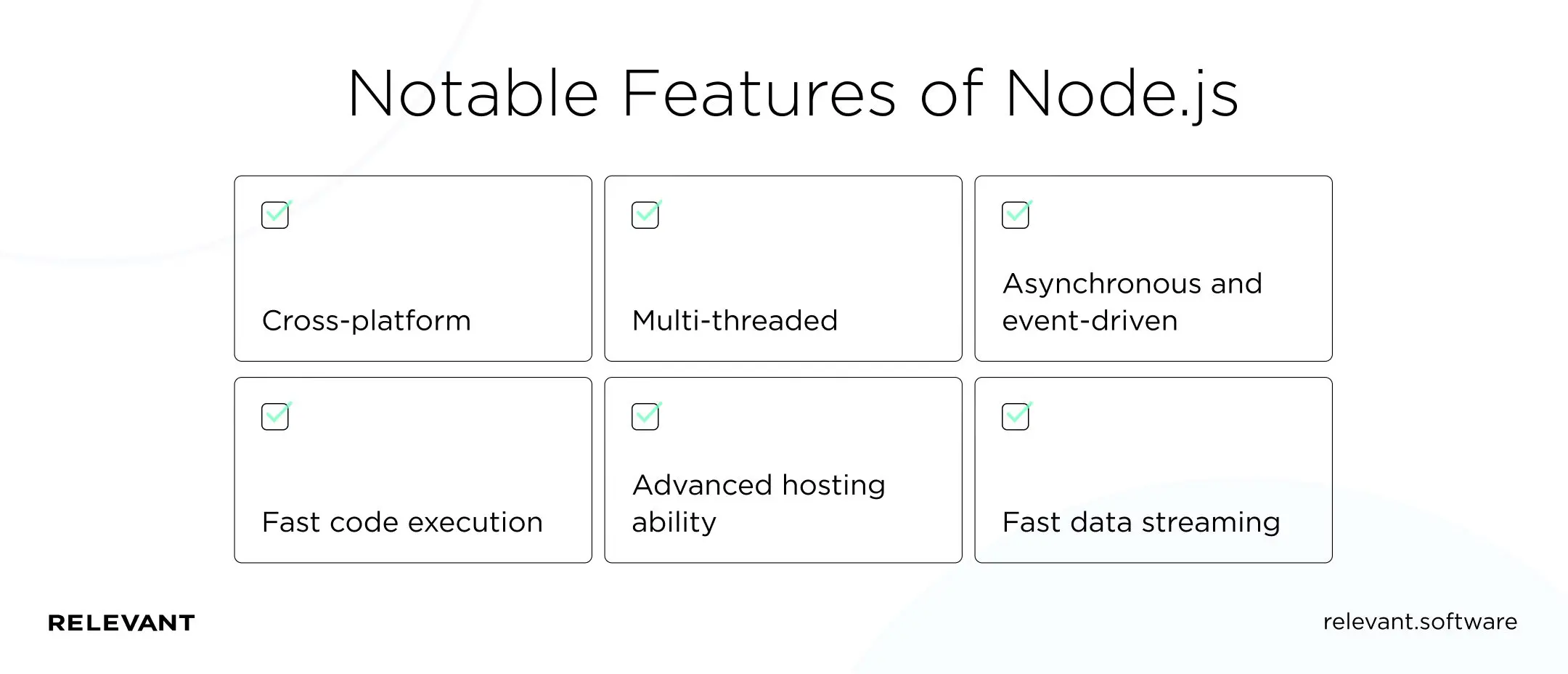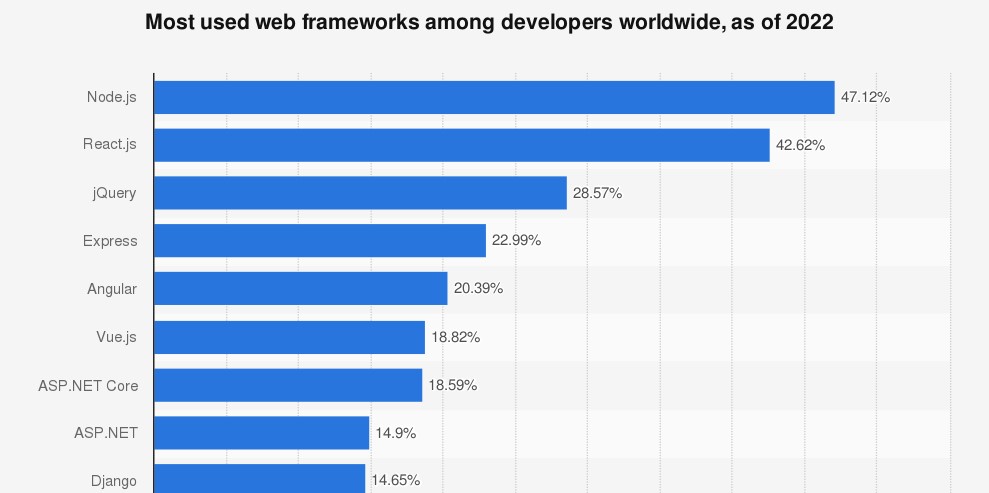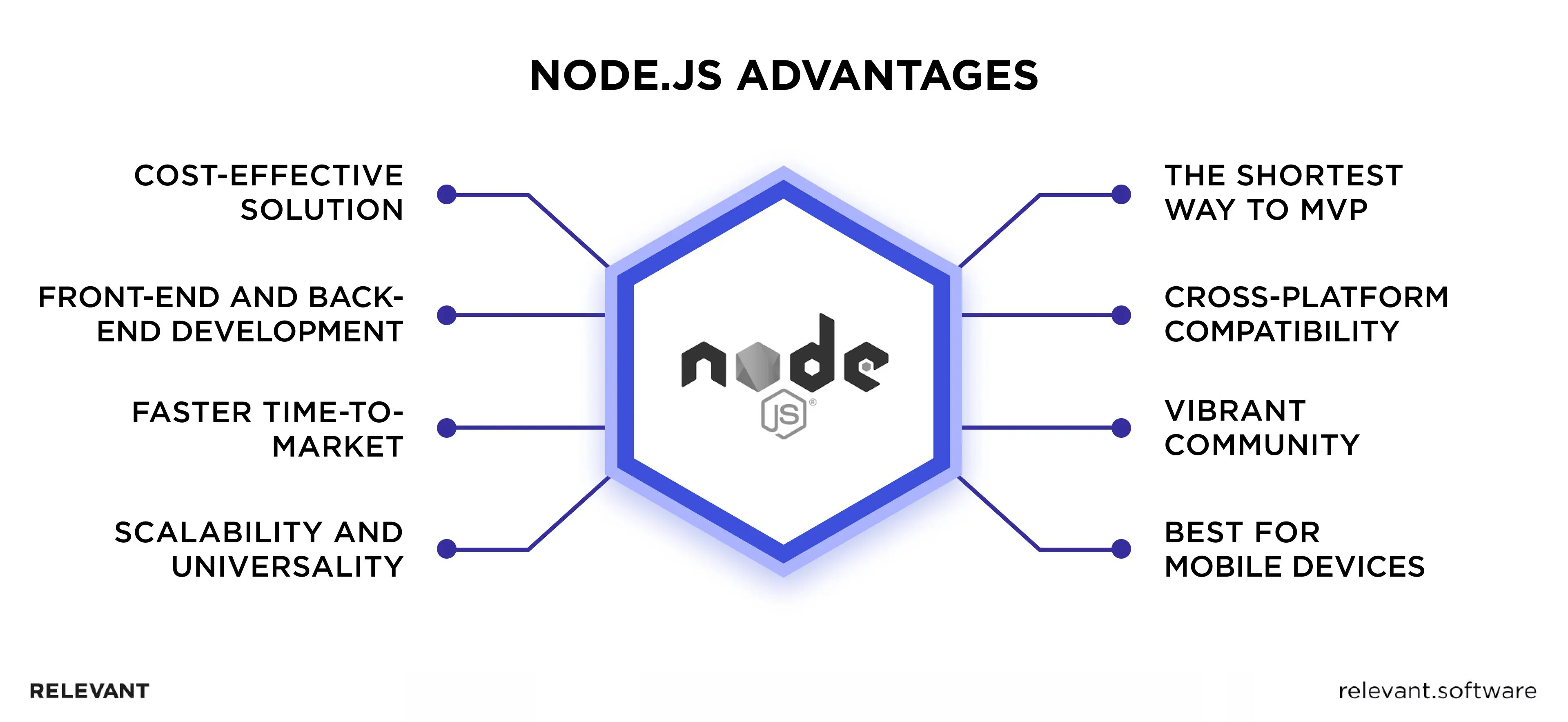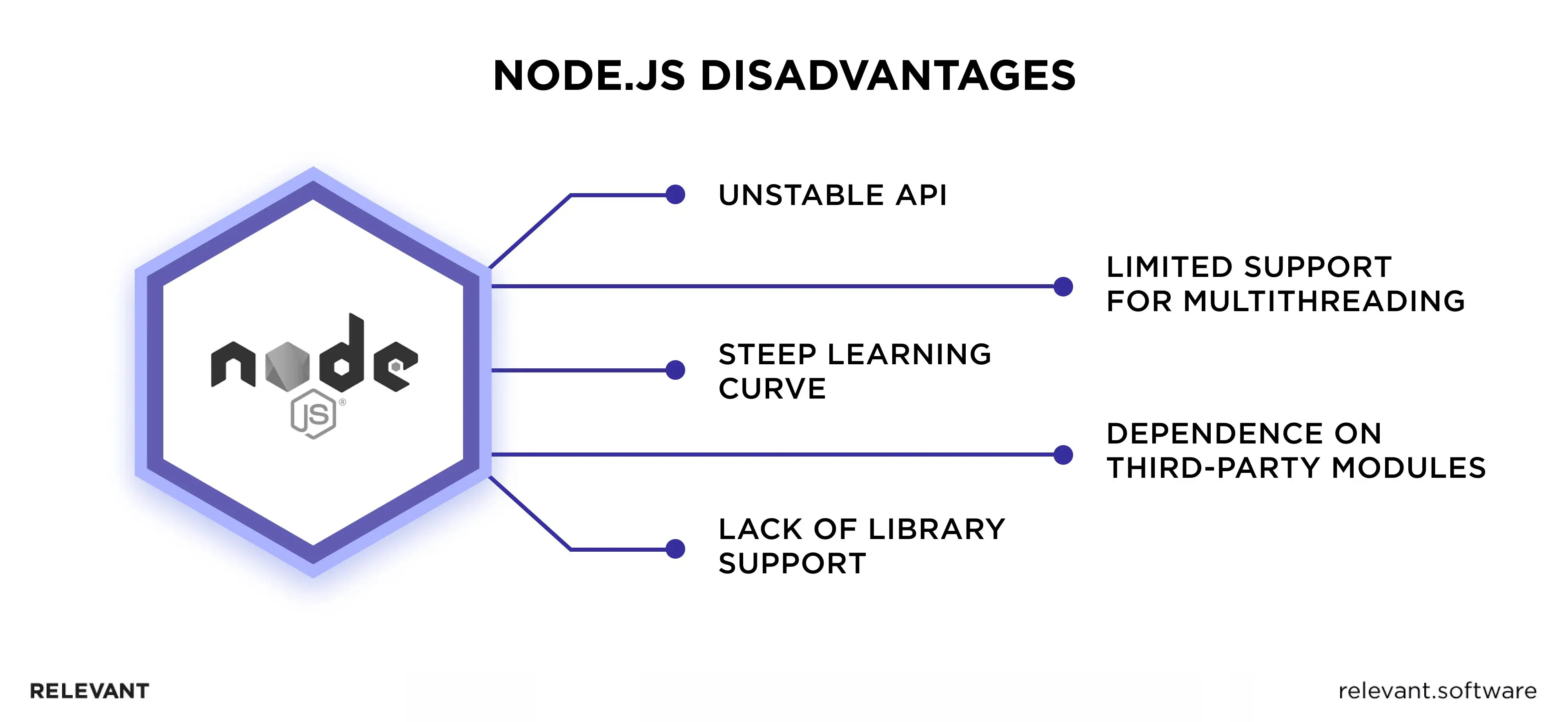8 Advantages of Node.js Development for Startups in 2024

Every startup shares a singular objective – accelerated growth. Engineering teams require a language and environment that fosters swift iteration at minimal expense.
Selecting the appropriate programming platform and technology stack is as crucial as allocating the right budget, devising a marketing strategy, and formulating a growth plan. This choice should consider factors such as scalability, development pace, community support, and learning curve. You can’t go wrong, as the future of your product depends on it.
Delving into the numbers, Node.js powers a staggering 30 million websites and counting as more companies embrace its capabilities. Introduced in 2009 by Ryan Dahl, Node.js revolutionized server-side development, allowing JavaScript execution beyond web browsers, and quickly gained traction as a top choice for crafting scalable, high-performance web applications.
from 25 countries outsourced software development to Relevant
We provide companies with senior tech talent and product development expertise to build world-class software.
So if you’re evaluating the pros and cons of Node.js for your next project, it’s, of course, crucial to understand just how powerful this JavaScript runtime can be. Let us share our rationale for why Node.js will be just as popular in the startup community in 2024.
Why Node.js and How it Works?
Node.js is the go-to choice for developers seeking a high-performance, scalable, and unified development experience. Built on Chrome’s V8 JavaScript engine, Node.js ushers JavaScript into the realm of server-side programming, breaking the barriers between front-end and back-end development.
How Node.js works lies in its non-blocking, event-driven architecture. Unlike traditional server-side languages that rely on multi-threading, Node.js utilizes a single-threaded event loop to manage requests efficiently. This design choice enables Node.js to handle numerous simultaneous connections without bogging down the system or incurring excessive resource overhead.
Node.js thrives in scenarios that demand real-time, data-driven applications, such as chat applications, online gaming, or live streaming services. By employing JavaScript across the entire stack, Node.js promotes code reusability and streamlines the development process, boosting productivity and reducing context-switching for developers.

Node.js is best suitable for developing:
| Real-time web applications | Streaming applications |
| Messaging applications | Chatbot programs |
| Social media applications | Virtual emulators |
| Multiplayer games | Real-time collaboration tools |
| Online payment systems | IoT applications |
| REST API servers | Single-page applications |
In recent years, Node.js has gained significant popularity among developers, with 47.12% of them choosing this open-source server environment as their leading web framework. Not surprisingly, many startups and corporate companies are leaning towards this.

Why is Node.js Great for Startups?
What benefits does Node.js actually offer you as a startup? In this section, we list six objective reasons why you should choose Node.js for your web or app development projects.

1. Cost-effective solution
One of the most prominent Node js advantages is the use of a single programming language (JavaScript) for front-end and back-end development. As a result, startups won’t need to engage separate developers. Also, Node.js require fewer files and less code. It helps save a lot of time, money, and energy in startup product development—a significant benefit for startups with limited funds.
Another benefit of Node.js is its performance. The V8 JS engine corresponds to Javascript code directly in native code. This makes it resource-saving and also increases the speed of the framework.
2. Faster time-to-market
Time is priceless for startups. They have to work tirelessly for the first few months to iterate, test, deploy, and deliver as quickly as possible while still on a tight budget and a lean team. Node.js is particularly helpful in making the time-to-market cycle shorter.
The first thing is that the technology is lightweight and can massively reduce the application development time while achieving the same functionality. With Node, you can get from idea to product in a snap. Secondly, simple deployments help you get immediate feedback from the production environment.
3. Scalability and universality
Scalability is built into the core of Node.js. It is one of advantages of Node js for startups planning to grow over time. App-based startups choose to develop lightweight and fast systems with good real-time responses that can be scaled up later and add more modules to the existing ones easily. You never know how high you will go.
Node’s scalability is achieved through load balancing and the capability to handle a huge number of concurrent connections. Moreover, Node’s apps support both vertical and horizontal scaling.
What Node is good for is its compatibility with microservices architecture, which is beneficial for projects that will scale and grow in the future. Also, it is possible to create a separate microservice for any functionality and then scale it separately from all other parts.
4. The shortest way to MVP
Often, tight budgets and timelines mean that a startup should quickly test a product’s competitiveness with the least amount of effort and investment to ensure the product is well received before paying more for development.
The next Node.js advantage is its effectiveness in quickly turning a concept into a prototype. Regardless of the project you are working on, it won’t take long. With Node.js, developers can rapidly develop an MVP (Minimum Viable Product) for user feedback to improve the next iteration and assess product viability. With an MVP, startups can find the right audience, use insights from experience, and save time.
5. Vibrant community
Node.js has a lively community of developers and enthusiasts worldwide. They contribute to Node.js development, making it more accessible and innovative. By hosting Node.js on GitHub, developers easily collaborate on code, track issues, and manage version control.
Node.js boasts a powerful package manager, NPM, offering over 2.1 million packages of reusable components to expedite code sharing and enhance functionality. This treasure trove empowers developers to concentrate on their application’s unique features rather than reinventing the wheel.
6. Best for mobile devices
This might be the biggest benefit of using Node js. Fast development time, ease of use, and the ability to scale with increasing traffic make it an indispensable tool to move your company toward the mobile mainstream. In today’s environment of rapid mobile app development, this is no small matter.
Do you require a mobile app that also connects to the desktop app? You can also benefit from Node.js in this situation. Especially in the macOS ecosystem, a large portion of the code you use for your mobile app may be immediately migrated to desktop programs.
7. Front-end and Back-end Development
Beyond back-end development, Node.js thrives in the front-end realm, empowering developers to build full-stack applications using frameworks like Express.js and Socket.IO. This unified approach streamlines development and diminishes the necessity for separate front-end and back-end teams, ultimately saving both time and resources.
8. Cross-Platform Compatibility
Finally, Node.js’s cross-platform compatibility exemplifies its remarkable versatility, enabling the creation of applications that run seamlessly on Windows, macOS, and Linux, ensuring a broad reach and smooth user experience across diverse operating systems.
By unifying development efforts, Node.js eliminates the need for platform-specific code and reduces the complexity of managing multiple codebases. This fosters a more efficient development process, as teams can focus on crafting a single, cohesive application that caters to a broader audience.
To sum it up, by choosing Node.js, you get:
- Easier development process
- Efficient performance
- Ability to handle multiple requests
- Smooth scaling capability
- Reusable code
- Asynchronous event-driven programming
- Prompt code execution
- Supported by leading companies
- First-class prototyping
- A huge pool of talent
- Development of microservices
- Hosting anywhere
Best Node.js Frameworks Overview
Over the years, the JavaScript community has seen a surge of remarkable Node.js frameworks, crafted by seasoned developers to revolutionize web app development. As we delve into 2024, we’ve meticulously researched and compiled a list of the top 10 most popular Node.js frameworks that guarantee scalability, speed, and exceptional performance for your next web app endeavor.
- Express.js: Reigning supreme among Node.js frameworks, Express.js is renowned for its lightweight and versatile nature. This minimalistic powerhouse streamlines web application and API development with many features, including middleware configuration, routing, and template engines. It’s the go-to choice for developers seeking simplicity and elegance.
- Koa.js: A brainchild of the Express.js team, Koa.js elevates web app foundations with its expressive and robust design. Harnessing the power of ES2017’s async functions, Koa.js eradicates callback chaos, paving the way for a cleaner and more maintainable codebase. Embrace its modular, lightweight approach to tailor applications with only the essentials.
- Nest.js: A versatile gem, Nest.js champions TypeScript as its default language. Designed to deliver scalable, maintainable, and testable applications, this framework boasts an Angular-inspired, modular architecture with dependency injection and decorators. It’s the perfect partner for large-scale enterprise applications that demand structure and stability.
- Hapi.js: Flexibility and power collide in Hapi.js, a framework for building configurable web applications and services. Its robust plugin system encourages seamless feature integration while built-in input validation, caching, and authentication support fortify your projects. Embrace Hapi.js for a configuration-driven development experience.
- Sails.js: Sails.js sets sail on the real-time, MVC-style framework wave, built upon the solid foundation of Express.js. Ideal for creating custom, data-driven APIs and modern web applications, Sails.js features an ORM called Waterline for seamless database and data model management. Opt for this framework to breathe life into real-time applications, such as online multiplayer games and chat applications.
- LoopBack.js: Embrace the power of LoopBack.js, an open-source, highly extensible Node.js framework for crafting APIs and microservices. With its mighty CLI and support for model-driven development, LoopBack.js offers API documentation, authentication, and role-based access control out-of-the-box. A wide range of connectors ensures compatibility with diverse databases and services.
- Fastify: Fastify, a high-performance, low-overhead web framework, provides exceptional speed and efficiency for Node.js projects. Built on the HTTP/2 protocol, Fastify guarantees swift request/response times. Its plugin-based architecture and built-in schema-based validation and serialization enhance performance and developer experience.
- AdonisJS: A full-stack MVC framework that runs on Node.js, AdonisJS is designed to build highly scalable and maintainable web apps. It grants a comprehensive development experience that includes routing, authentication, validation, etc.
- Nuxt.js: It is a powerful tool for creating server-rendered Vue.js apps. Nuxt.js simplifies the entire development process by providing a higher-level abstraction and handling essential features like routing, code splitting, and automatic static file generation.
- Meteor.js stands as a comprehensive full-stack platform for crafting web and mobile applications using pure JavaScript. Its support for rapid prototyping and generation of cross-platform code, coupled with seamless integration with renowned front-end frameworks like React, Angular, and Vue.js, positions Meteor.js as a top choice for developers seeking an all-encompassing solution.
These frameworks have undergone a remarkable evolution and improvement, equipping developers with diverse options for creating an array of applications, ranging from straightforward web services to intricate, data-driven solutions.
Drawbacks of Node.js for Startups
Despite its popularity for web development, startups should also consider Node.js’ potential drawbacks. While it provides a fast, lightweight, and efficient platform for constructing scalable web applications, certain challenges may arise, warranting a thorough evaluation of its suitability for specific projects.

API instability
Node.js’s fluctuating API landscape demands vigilance, as developers must adapt their codebases to maintain compatibility with the latest releases, potentially consuming valuable time and resources.
Multithreading constraints
Node.js’s single-threaded design may limit its ability to handle computationally intensive tasks efficiently, posing challenges for startups venturing into domains like machine learning or video processing.
Steep learning curve
For developers new to Node.js, there can be a steep learning curve in mastering its unique architecture and event-driven programming model. So partnering with vendors that provide skilled Node.js programmers can be especially relevant for startups that may not have the resources to invest in extensive training.
Dependence on third-party modules
A significant portion of the functionality provided by Node.js comes from third-party modules, which can introduce additional risk and complexity to your application. Startups must be diligent in evaluating the security and stability of these modules and the vendor’s ability to provide ongoing support and updates.
Lack of library support
Node.js has a ton of tools and modules accessible for developers because it is an open-source technology, but the documentation is sometimes lacking. Hence, attracting Node.js developers with enough technology experience is crucial to avoid getting into this trap.
Which Companies Use Node.js?
As demonstrated, Node.js web application development offers numerous advantages of Node js, but it may not be the perfect fit for every scenario. Nevertheless, it stands out as the ideal choice for crafting scalable and dynamic software products. If your project targets a broad audience and you plan to scale your business, this technology can help you attain your objectives. Furthermore, if you anticipate your prospective solution to handle multiple requests at the same time, Node.js should be your top choice.
This is precisely why many leading tech companies depend on Node.js to deliver real-time services to their customers. Let us explore some remarkable examples of renowned brands from diverse industries that have selected Node.js for their projects:
- LinkedIn: As the world’s largest professional networking platform, LinkedIn leverages Node.js for its backend, significantly enhancing its performance and scalability. The choice of Node.js has also allowed LinkedIn to simplify its codebase and streamline the development process.
- Netflix: The renowned streaming platform Netflix effectively employs Node.js and JavaScript to revolutionize its website into a sleek, single-page application. This strategic move allows Netflix to create a seamless and user-friendly experience, ensuring that subscribers can effortlessly navigate and enjoy their favorite content. By implementing Node.js, Netflix optimized its backend, powered by Java, and its user interfaces, resulting in a more seamless user experience.
- Uber: As an early adopter of Node.js, Uber has built an extensive API ecosystem that features over 600 stateless endpoints written in Node.js. This enables better connectivity and reduces management overhead, contributing to the company’s rapid growth and success.
- NASA: The US space agency, NASA, has turned to Node.js to consolidate data from multiple legacy databases into a single, cloud-based system. NASA has significantly reduced data access times by employing a microservices architecture with Node js-built APIs and apps, streamlining their operations.
- Trello: The widely-used project management tool, Trello, relies on Node.js for server-side operations, ensuring instant, real-time updates with minimal delay. Using Node.js contributes to Trello’s responsive and efficient performance, making it a top choice for project management.
- PayPal: By adopting Node.js, PayPal has improved its development process and boosted its performance. The implementation of Node.js has led to a reduction in code size and app files, as well as faster page load times and improved response times, enhancing the overall user experience.
These enterprises represent just a fraction of the numerous organizations that have adopted Node.js, recognizing its adaptability and effectiveness in addressing their technical needs.
How to Create a Web Application Using Node.js
So, whether you’re looking for a faster time-to-market, a solid development tool, or an accelerated MVP development schedule, Node.JS can accomplish all of those things. Just keep in mind that the order in which applications are created is critical.
- Ensure Node.js is what you need for the core of your web application (we hope this guide was helpful).
- Prepare a specification (or mockups, use stories as a starting point) with agreed features and written expectations.
- Work with a technology stack to complete project development (applies to related technologies – frameworks, libraries, cloud services, etc.).
- Architect the application with your own solution architect or a third-party expert (we offer this option).
- Implement your first MVP functionality, covering it with tests and relying on user feedback.
The only thing left is finding and hiring a reliable Node.js development company that will immediately start working on your development project.
How and Where to Hire Node.js Developers?
Clients usually prefer to go to software development companies because software development is just part of the whole business. By now, many people know that outsourcing some non-core tasks (in some cases, core ones) can bring better results because teams with focused experience are more effective.
You won’t have to go far. Relevant is your best bet when you are looking for Node.js consulting services to help you get your project up and running. We can make the most of the powerful features of Node.js technology and perform your most ambitious plans. So if you need to hire Node.js developers, contact us today.
FAQ
How to check the quality of Node.js developers?
Seasoned Node.js developers should have the following skills: – experience with Node.js libraries and frameworks (Express, Nest, Koa);- knowledge of the Node.js ecosystem and development tools;- familiarity with the fundamentals of front-end technologies (JavaScript, CSS, HTML, etc.); – competence with databases;- expertise with REST API development;- proficiency with cloud development;- understanding of the fundamentals of software testing.Can I move to Node.js if my app is based on Java?
You can definitely accomplish it. Netflix shifted from the monolith Java application to the real-time web with Node js. There are cases of moving from Go, Python, and similar backend languages. We at Relevant strongly recommend microservices so you can get a new system that is more performable due to splitting architecture.What are the pros and cons of Node.js?
Node.js shines with its high performance, unified language, robust ecosystem, and wide adoption, making it perfect for data-driven, real-time applications; however, it struggles with CPU-intensive tasks and callback hell, warranting caution for complex computing projects.

Hand-selected developers to fit your needs at scale! Let’s build a first-class custom product together.

